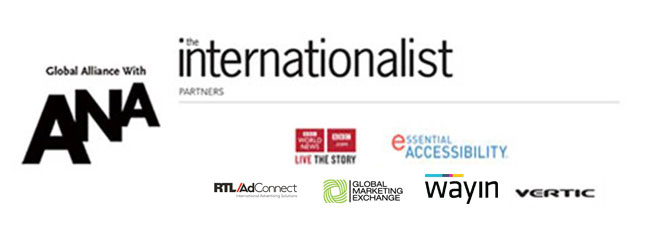

Manuel Reyes of Cortex
See the current issue
of The Internationalist magazine
Find out how to sponsor an issue of Trendsetters
|
|
If you have spotted a trend or given a recent presentation on a global issue, please tell use and don't forget a photo of yourself!

To submit to Trendsetters, contact me at: linkedin.com/in/deborah-malone-ab5897,
The Internationalist group on LinkedIn:
https://www.linkedin.com/groups/2560753/or at Twitter--@DMaloneIntl
TRENDSETTERS: Manuel Reyes of Cortex Rallies the Industry to Audit Forward and Future Proof Media
The Internationalist Trendsetters is written by Deborah Malone, founder of The Internationalist.
Ask Manuel Reyes of Auditing and Consulting firm, Cortex Media, about the state of trust in the media supply chain, and he'll tell you, "it is at a boiling point.” A member of the ANA's new Trust Consortium, which is run in partnership with its legal counsel and advertising law firm, Reed Smith, Reyes believes that today's media supply chain is "clearly broken and needs to be reengineered.” He has two key ideas that can help marketers deal with these issues and calls them "auditing forward” and "futureproofing your media."Manuel Reyes asserts: "cleaning up the media supply chain presents one of the most effective opportunities to secure future growth."
Today's complex environment of media buyers, intermediaries, sellers, and brands are confronted with the challenge of understanding and dealing with an ever-growing, opaque marketplace. Some believe this is the result of an industry that's built a structure so complex, it purposefully obfuscates the buying process. Others feel it is the responsibility of marketers-- who are often overwhelmed or simply uninformed about the "daisy chain"of organizations making money fraudulently throughout the media ecosystem.
"Marketers can no longer hide behind what they don't know,"says Reyes, "especially when the process is now more knowable. They must have uncomfortable conversations with their agency, tech and media partners.” According to the ANA, just 40% of clients are comfortable with the transparency they receive from programmatic media investments.
He emphasizes, "We should all be talking about the media supply chain being broken. It is reality—as much of a reality as the current FBI investigation.
The transparency debate, and the growing distrust between advertisers and media buying agencies, took a new, unprecedented turn on October 10, 2018 when the ANA notified its membership that the U.S. Federal Bureau of Investigation (FBI) asked the organization to inform its members about their investigation into non-transparent advertising practices and to also ask members to consider cooperating with the FBI if they believed they might have been defrauded by their agencies.
The ANA and its counsel, Reed Smith, issued a White Paper on media transparency pertaining specifically to the inquiry by the FBI into potentially fraudulent media buying practices: Media Buying 2018 – Transparency At a Crossroads.
The White Paper does emphasize that "At this point, no one has been accused or charged with any crimes and no one is accusing anyone of criminal behavior. No one should assume anyone is guilty of any criminal infraction."
However, the White Paper does underscore the seriousness of the investigation itself: "The FBI and Department of Justice typically do not commit resources unless they believe, at a threshold level, that potentially criminal activity has taken place. The FBI has told Reed Smith this is a long-term, industry-wide investigation."
So, what does this mean to your company? "One day—likely sooner rather than later, says Reyes, "a marketer will get a phone call from his or her CEO or CFO asking why the Federal Bureau of Investigation is knocking on their door or why shareholders are concerned about fraudulent practices. It's no different than the reaction to a data breach. While one individual can't necessarily be blamed for the occurrence of such an event, a CMO, Head of Media and marketing procurement executives will need to have answers."
"Wouldn't it be best,"says Manuel Reyes, "to say to a CEO— ‘Yes, we were expecting a call about these practices as this is a huge issue. We've taken every reasonable measure that's available to us through these five steps and the language in our contract.'” This is what future-proofing your media is about. While he states that he's not trying to be the voice of doom and gloom, he believes the industry is at a flashpoint, and someone in an organization will be demanding accountability soon. "You don't want to say— ‘but I was too busy saving one percent on my media or I thought that reducing my agency fees by a tenth of a percent would create savings.' You need to have real answers."
According to Reyes, marketers have a duty of futureproof themselves. A proper contract review and media audit should be the start. Next steps on how to best futureproof your media supply chain will come out of this. It may follow that a marketer requires greater understanding of media compensation packages and changing incentives. Or a marketing leader may choose to delve into discovering the actual value of media rather than looking for the cheapest price.
Plus, it about taking some basic steps—from recognizing this is a problem that must be stopped to educating everyone in the organization, especially leaders, about the situation.
Plus, all media audits should be forward-looking. Says Reyes, "We call this ‘audit forward.' It's nice to know what you did well, or perhaps didn't do well. However, it's far more important to use audits to inform what you should do next. Too often, people put an audit in a drawer and forget about it. This is the first step not only in determining how you might expect to improve in terms of pricing, but in fighting to restore real accountability and transparency.
Manuel Reyes is the founder of Cortex Media and has been providing media auditing and consulting services to top-tier advertisers in North America, Latin America, Europe, and Asia since 2001. Before that, he was Chief Executive of Starcom Latin America. He also led MediaVest's Latin America and US Hispanic divisions. Over the last 25 years, Manuel has held management positions at several agencies, advertisers, and media companies.
Cortex Media helps create a media value advantage for marketers. The company is recognized globally as a resource for balanced and independent viewpoints on key advertising media topics in US and worldwide-- from Media Performance Optimization to Digital Media Cost Benchmarking and Review to Financial Compliance and Transparency to Agency Management and Evaluation.
